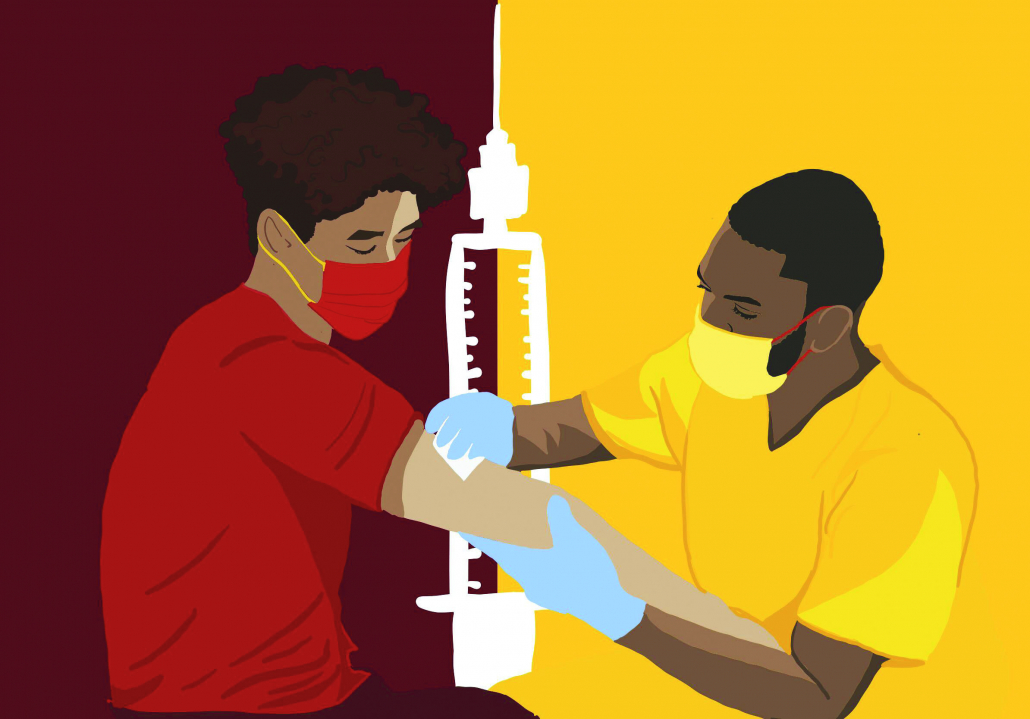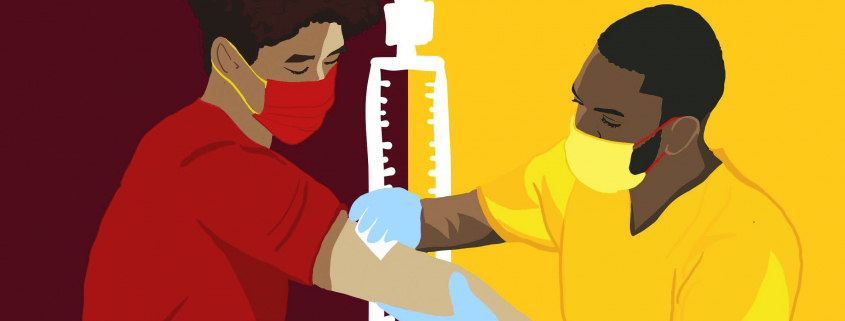University plans vaccination push

As the fall semester approaches and USC looks to fill lecture halls with students and the Los Angeles Memorial Coliseum with screaming fans, vaccines have offered an opportunity for University students, faculty and staff to finally return to normal with a lessened risk of contracting the coronavirus.
However, misinformation, institutional distrust, religious views and lack of access have slowed the vaccination rate in the United States, threatening reopening plans and increasing the risk of coronavirus outbreaks. The Delta variant, which is two times more contagious than the initial coronavirus strain according to NPR, has further heightened the urgency for vaccinations.
According to the “LA County Daily COVID-19 Data” page, 3,865 new cases were reported Aug. 12. Between Aug. 1 and 7, USC reported 47 positive cases out of 2,961 tests — 37 students and 10 employees.
USC is requiring vaccinations from all community members, barring religious or medical exemptions. Before the recent increase in cases, students were allowed to file a vaccine declination form if the vaccines were still under emergency use authorization.
In March, USC launched its Covid-19 Vaccination Program and strongly encouraged all faculty, staff and students on campus to receive vaccinations as soon as they became eligible.
As of Aug. 10, 90% of domestic undergraduate and 89% of graduate domestic students — students who are U.S. residents — 66% of undergraduate international students, 75% of graduate international students, 90% of faculty and 88% of staff are vaccinated, Chief Health Officer Dr. Sarah Van Orman said in a student media briefing Thursday. The number of vaccinated international students is expected to rise as students arrive to the U.S., where the vaccine is more available, Van Orman said.
Charlie Siegel, a sophomore majoring in public relations, was vaccinated early February. He spent last school year living in an off-campus apartment, and he saw many of his peers get vaccinated as well.
“All the people that I surround myself with were definitely very eager to get vaccinated, as I think everyone should be,” Siegal said. “It’s such a revolutionary vaccine in the first place … and I definitely think that everyone should be eager to go and get it.”
Despite the push Siegel noticed from USC through emails and social media posts, the current vaccine policies left him with some anxieties about the upcoming school year.
“I do think that there are a lot of people our age that are kind of relaxed about it just because they think we’re still young and that it’s not going to affect us as badly … I don’t think a lot of people our age look into the news as much as they should,” Siegel said. “There’s so much information out there that they really should be reading to make themselves more aware of this issue, because it’s so directly affecting us and our ability to enjoy our college experience.”
To allow students, faculty and staff to inquire about vaccinations and their health, USC launched the community outreach program, “Ask a Doc.”
“We are coming to the phase where there are people who are vaccine hesitant,” Minnie Ho, executive director of communications at USC Student Health, said in an interview with the Daily Trojan. “What we’d like to do, as health professionals and to support our public health initiative is really to encourage everyone in the public to get vaccinated, and also to dispel some reasons why people might be hesitating to get the vaccine, which are not based on factual information.”
The program emphasizes health communication research, particularly the idea that pro-vaccine messages are likely to be trusted by the public when they come from two particular categories of people: doctors and University leaders.
The program organized messengers with a wide scope of experiences who will be available to address questions and concerns for people in different schools. It will also have workshops, including one for people with a fear of needles.
“The purpose of [the sessions] is not to have debate about COVID and policies that the government took over the past year, but really the purpose is to educate on what we do know about the vaccine,” said Dr. Kimberly Tilley, co-medical director of USC Student Health, in an interview with the Daily Trojan.
For those who decline the vaccine, other requirements are in place to limit cases on campus.
“[Unvaccinated members of the USC community] have to participate in regular surveillance testing, which is twice a week for undergraduates and once a week for graduate professional students, faculty and staff,” Van Orman said.
However, provided that unvaccinated people follow testing requirements, they will not be restricted from events or campus activities.
“We are creating all of our events to be a mix of vaccinated and unvaccinated people,” Van Orman said. “We won’t create anything that excludes people who are unvaccinated, provided they are complying with the surveillance testing requirements.”
USC continues to plan a return to in-person classes for Fall 2021 and is devising an in-person convocation to welcome new students to campus. Though coronavirus regulations are uncertain, health and University officials are confident that USC will have high vaccination rates in the upcoming semester.
“By the time everybody comes back to campus, the numbers are going to be way over 90%,” Van Orman said. “There’s groups of students who just simply weren’t able to get the vaccine, and once they arrived, we’re going to be far above 95% in terms of the percent of our campus that’s fully vaccinated.”

